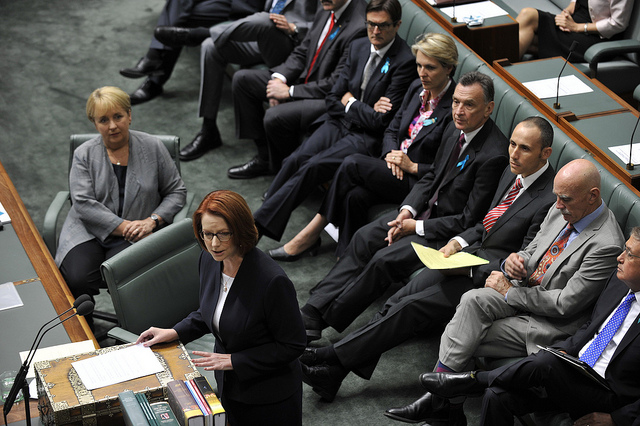Strengthening Parliament’s role over military operations
Posted By Peter Jennings on March 26, 2013 @ 13:51
 [1]
[1]I certainly agree with Graeme Dobell’s recent post [2] that debating the powers of the Prime Minister and the Parliament over the prerogative to go to war is an important subject. Moreover it’s one on which I suspect Graeme and I would mostly agree. He stops short of saying that Parliament should have some final right to authorise deploying Australian troops. Frankly that’s the only sensible response when you consider the structure of our system of government. The fact is that, although the media increasingly presents Australian politics as being like Washington, we remain resolutely a Westminster system—where the executive government is of the Parliament, not separate to it. Our Parliament can’t act like the US Congress, as an arm of government separate to the executive, because doing so in our system in effect brings the government down. And our Senate is there as a house of review rather than an alternate executive government.
So much for politics 101. Those who support giving Parliament a right of veto over Government decisions to deploy troops tend to that view, I would argue, out of a hope that the Senate will block such deployments; governments tend seldom to have majorities there. In other words, their position is based more on an expectation about how Australian politics really works (Oppositions oppose things, for example) than out of any belief that Parliament will redesign itself into the US Congress and hold different policy positions on national security to the government.
But that doesn’t mean to say Parliament can’t play an important role in shaping how governments direct military operations overseas. Deployments since Iraq in 2003 establish the contemporary practice of Parliament’s role in deployments.
The first emerging practice is for the Prime Minister to make a detailed statement to Parliament about the basis of a government decision to deploy forces. John Howard did this in relation to Iraq in February and March 2003 and his statements were debated in both houses of Parliament. Detractors will say that this doesn’t amount to much because governments typically control the numbers in the House of Representatives. Maybe so, but the practice runs counter to the current trend of governments making major policy statements outside Parliament. It’s easier to launch policies, as the 2009 Defence White Paper was, on the deck of a warship [3] with no debate and only a handful of bemused journalists to please. Parliament is a much more difficult theatre. Developing such a statement forces governments to consider the basis of opposition to deployments and of the need to make a convincing case for their decisions.
A second practice has been for Governments to commit to reporting to Parliament on progress in military operations. John Faulkner, a believer in the importance of Parliamentary debate, adopted this in the form of quarterly reports on the Afghanistan operation. This has been continued by Stephen Smith [4]. Julia Gillard has added to the practice with an annual Prime Minister’s statement on Afghanistan [5].
With some reinforcement, I believe this practice could strengthen Parliament, put governments on their mettle and perhaps even satisfy those who hanker for a Canberra that looks more like Washington than Westminster. These practices—let’s call them the Howard and Faulkner initiatives—force governments to confront the implications of their policies, test the adequacy of decisions, give Parliamentarians the opportunity to shape thinking through the quality of their contributions and ultimately stand as history’s record for later generations to judge. Anyone who says that isn’t important—or that governments don’t care deeply about them—hasn’t been involved in developing such statements. It’s up to MPs in their Party Rooms to demand that similar approaches are used in future.
A third development, albeit a less well established one, has been for Parliamentary Committees to scrutinise critical aspects of decision making about military operations. Graeme Dobell mentioned the outcome of one of these best efforts—a recommendation by the then Joint Committee on ASIO, ASIS and DSD (now the Joint Committee on Intelligence and Security) that there should be an independent review of the performance of intelligence agencies’ reporting on weapons of mass destruction programs in Iraq. That led to the review by Phillip Flood. Its precursor, the Joint Committee review, was based on a reference from the Senate and wasn’t welcomed by John Howard. The committee produced a sensible, balanced and fair report—a model in fact of what well-chaired Parliamentary Committees can achieve.
Committees could do a lot to strengthen Parliament’s responsible assessment of decisions to go to war. Now would be a good time for a forensic review of the record of deployments in the Pacific since Bougainville in the late 1990s. Equally, there would be no better time than now for a Committee to review the lessons emerging from Afghanistan, before the process is hijacked by a variety of interest groups with points to prove.
With some consolidation, the measures I’ve described here can be codified into a modern Parliamentary practice to oversee military operations. It might go some way to satisfy the wishes of those who pine for Washington on the Molonlgo. For it to work, governments need to show more respect more than they have for the value of bringing policy to Parliament. In response, Parliamentary committees need to improve their act beyond the poor theatre of the budget estimates process. Everyone would win from that.
Peter Jennings is executive director of the Australian Strategic Policy Institute. Image courtesy of Flickr user Julia Gillard [6].
Article printed from The Strategist: https://www.aspistrategist.org.au
URL to article: https://www.aspistrategist.org.au/strengthening-parliaments-role-over-military-operations/
URLs in this post:
[1] Image: http://www.aspistrategist.org.au/wp-content/uploads/2013/03/8454304265_cd04a3d13c_z.jpg
[2] recent post: http://www.aspistrategist.org.au/iraq-and-the-pms-profound-prerogative/
[3] on the deck of a warship: http://www.defence.gov.au/media/download/2009/May/20090502/index.htm
[4] continued by Stephen Smith: http://www.minister.defence.gov.au/2013/02/07/minister-for-defence-paper-presented-on-afghanistan-transition/
[5] Prime Minister’s statement on Afghanistan: http://www.pm.gov.au/press-office/statement-house-representatives-%E2%80%9Cprogress-transition-preparation-future%E2%80%9D
[6] Julia Gillard: http://www.flickr.com/photos/juliagillard/8454304265/
Click here to print.